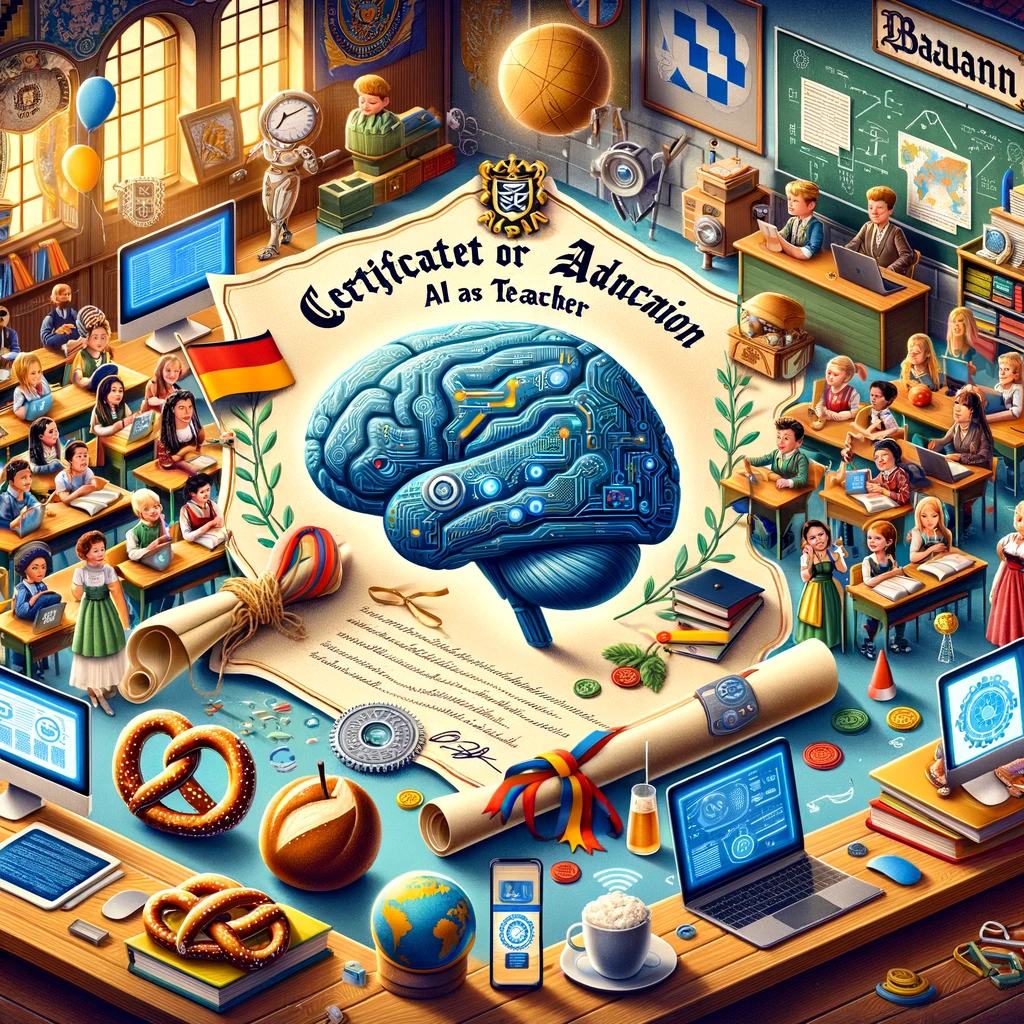Jan 4
/
Naz
Die Urkunde für KI als Lehrer
Bezüglich der Möglichkeiten fand ich den geteilten Artikel sehr aufschlussreich. Bei den Risiken sollten wir gründlicher nachdenken, bevor die (Beta-)Lösungen fest in unserem Alltag verankert werden.
Vor 25 Jahren, als ich neu in Deutschland war und gerade meinen Führerschein machte, absolvierte ich ein zweistündiges Einparktraining bei BMW. Anschließend bot man mir eine Urkunde an. Ich war verwundert und fragte mich, ob das wirklich nötig sei 🤔 . In diesem Moment sagte mein erfahrener bayerischer Fahrlehrer:

'Ein Deutscher ohne Urkunde ist nur ein halber Mensch.'
Dies lehrte mich die Wertschätzung von formalen Qualifikationen in Deutschland. Diese Lektion erinnerte mich daran, dass Lernen und Entwicklung in vielen Formen kommen, was mich zu meiner heutigen Arbeit mit KI führte. Seit 2016, als ich begann, mich auf KI in Bildung, Krieg und Ethik zu konzentrieren, hat mich meine Neugier auf unerwartete Wege geführt – wie zum Beispiel als Keynote-Speaker bei einer internationalen Bildungskonferenz über "Ethical Challenges of AI in Education" zu sprechen. Dies zeigt, dass das Streben nach Wissen und Verständnis, ähnlich wie das Erlernen einer neuen Sprache oder das Meistern einer Fähigkeit wie dem Einparken für mich, ein lebenslanger Prozess ist. 😊
Seitdem hat sich vieles entwickelt, sowohl im Bereich der KI-Technologie als auch in der KI-Ethik. Manchmal scheint es, als gäbe es mehr KI-Ethik-Experten als KI-Entwickler 🙃 . Meine Fragen sind seit 2020 nicht geändert. Z.B.
1. Wer entwickelt Lösungen für KI in der Bildung und wie?
2. Finden wir unsere alten Vorurteile und Missgeschichten in der KI wieder?
3. Unterscheiden sich die ethischen und moralischen Inhalte, die durch KI vermittelt werden, kulturell?
4. Haben benachteiligte Kinder mehr Zugang zu KI-gestützter Bildung?
5. Bietet KI Erwachsenen mehr Flexibilität und Möglichkeiten zur Weiterbildung
6. Wer prüft die Qualität der KI-gestützten Bildung?
Unternehmen, Eltern oder Öffentlichkeit?
Wer finanziert die KI-gestützte Bildung, und warum beteiligen sich Unternehmen nicht stärker, da sie am meisten von gut ausgebildeten Fachkräften profitieren?
Bad Boys?
Als begeisterter Anhänger der Khan Academy frage ich mich:
Warum gibt es weltweit immer noch nur eine solche Plattform, und was hält andere davon ab, ähnliche kostenlose Bildungsangebote zu schaffen? Könnte es sein, dass gewisse einflussreiche Organisationen nicht möchten, dass der Zugang zu Bildung, und somit zu geschäftlichen und finanziellen Möglichkeiten, für alle leicht zugänglich wird?"
Further Learning Resources:
WOMEN AI ACADEMY
Women AI Academy is a gender-equality and technology driven learning & development organization
Site Terms & Info
ETHOS AI Training & Consulting GmbH
Weihenstephanerstr.1281673
Munich-Germany
We are driven by the vision of making AI both ethical and accessible to everyone
Copyright © 2024 Brought to you by Ethos ai AI Training & Consultancy GmbH
Ali Hessami is currently the Director of R&D and Innovation at Vega Systems, London, UK. He has an extensive track record in systems assurance and safety, security, sustainability, knowledge assessment/management methodologies. He has a background in the design and development of advanced control systems for business and safety-critical industrial applications.
Hessami represents the UK on the European Committee for Electrotechnical Standardization (CENELEC) & International Electrotechnical Commission (IEC) – safety systems, hardware & software standards committees. He was appointed by CENELEC as convener of several Working Groups for review of EN50128 Safety-Critical Software Standard and update and restructuring of the software, hardware, and system safety standards in CENELEC.
Ali is also a member of Cyber Security Standardisation SGA16, SG24, and WG26 Groups and started and chairs the IEEE Special Interest Group in Humanitarian Technologies and the Systems Council Chapters in the UK and Ireland Section. In 2017 Ali joined the IEEE Standards Association (SA), initially as a committee member for the new landmark IEEE 7000 standard focused on “Addressing Ethical Concerns in System Design.” He was subsequently appointed as the Technical Editor and later the Chair of P7000 working group. In November 2018, he was appointed as the VC and Process Architect of the IEEE’s global Ethics Certification Programme for Autonomous & Intelligent Systems (ECPAIS).
Trish advises and trains organisations internationally on Responsible AI (AI/data ethics, policy, governance), and Corporate Digital Responsibility.
Patricia has 20 years’ experience as a lawyer in data, technology and regulatory/government affairs and is a registered Solicitor in England and Wales, and the Republic of Ireland. She has authored and edited several works on law and regulation, policy, ethics, and AI.
She is an expert advisor on the Ethics Committee to the UK’s Digital Catapult Machine Intelligence Garage working with AI startups, is a Maestro (a title only given to 3 people in the world) and expert advisor “Maestro” on the IEEE’s CertifAIEd (previously known as ECPAIS) ethical certification panel, sits on IEEE’s P7003 (algorithmic bias)/P2247.4 (adaptive instructional systems)/P7010.1 (AI and ESG/UN SDGS) standards programmes, is a ForHumanity Fellow working on Independent Audit of AI Systems, is Chair of the Society for Computers and Law, and is a non-exec director on the Board of iTechlaw and on the Board of Women Leading in AI. Until 2021, Patricia was on the RSA’s online harms advisory panel, whose work contributed to the UK’s Online Safety Bill.
Trish is also a linguist and speaks fluently English, French, and German.
In 2021, Patricia was listed on the 100 Brilliant Women in AI Ethics™ and named on Computer Weekly’s longlist as one of the Most Influential Women in UK Technology in 2021.

